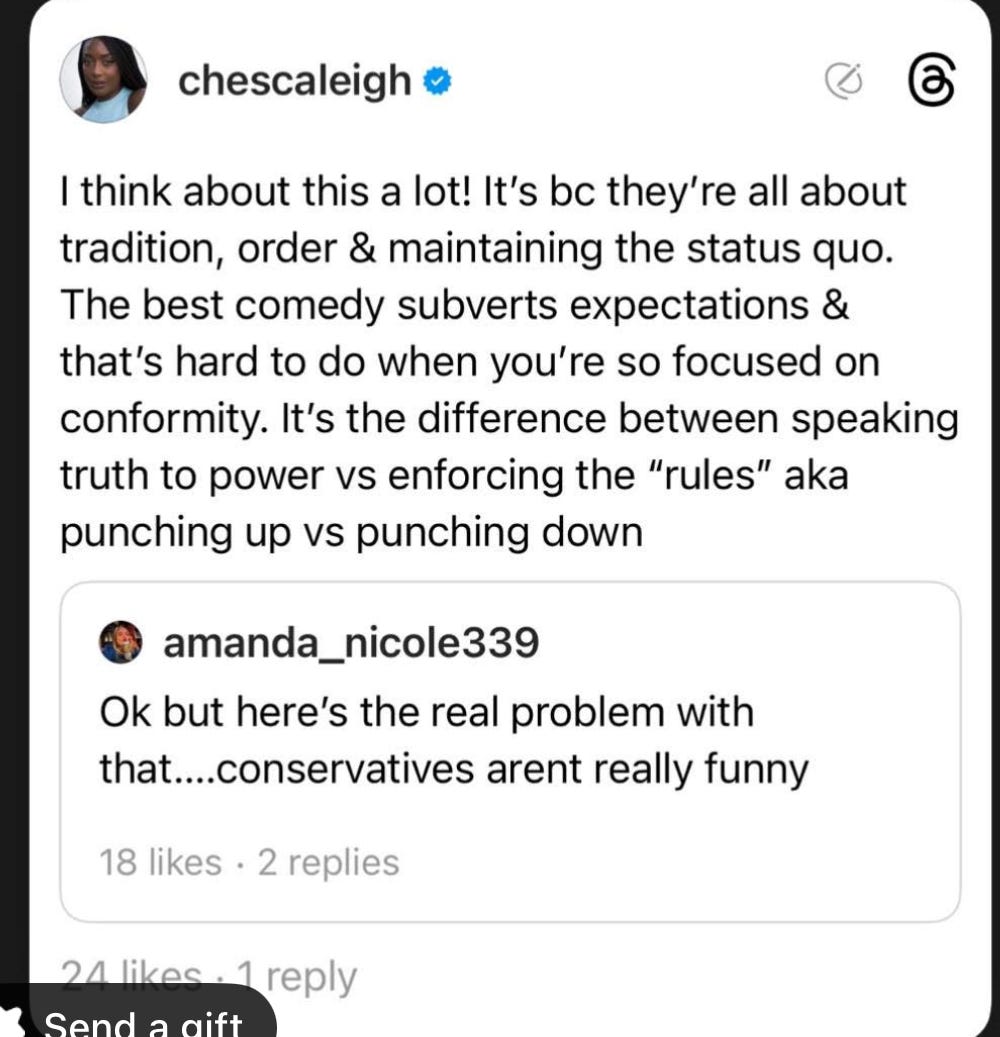Why MAGA Bullies Can Only Wish They Were George Carlin
The art of comedy
Comedy is subjective. It’s not like a math problem where two priests plus two rabbis always equal “ha ha.” However, it’s become conventional liberal wisdom that “conservatives” aren’t funny.
Last week, someone on social media repeated this sentiment, and comedian Franchesca Ramsey responded, “I think about this a lot! It’s bc [conservatives are] all about tradition, order & maintaining the status quo. The best comedy subverts expectations & that’s hard to do when you’re so focused on conformity. It’s the difference between speaking truth to power vs enforcing the ‘rules’ aka punching up vs. punching down.”
I’m a fan of Ms. Ramsey’s work, but I do think she falls into the liberal trap of assuming there is an objective comedic “truth.”
There’s a long list of conservative comics who successfully entertained people. Bob Hope was a Republican, and it’s not as if he avoided political humor. In 1940’s The Ghost Breakers, Hope asks someone what a zombie is. He’s told, “When a person dies and is buried, it seems a certain voodoo priest will have the power to bring him back to life … a zombie has no will of his own. You see them some times, walking around blindly with dead eyes, following orders, not knowing what they do, not caring.”
Hope deadpans, “You mean like Democrats?” (Watch below.)
This was a pretty pointed political jab, as Democrats at the time dominated the government. Democratic President Franklin D. Roosevelt was running for a record-breaking third term, which he’d easily win with 449 electoral votes to Republican Wendell Willkie’s 82. Democrats held overwhelming majorities in both the House and Senate.
Thus, you could argue that Hope’s zinger fit Ramsey’s standards for comedy: He’s punching “up” and speaking “truth to power” (an expression that sadly never seems to die). That’s the problem with defining “conservative” and “liberal” comedy based on whoever holds political power at the moment.
Conservatives or what I’ve called in the past “South Park Republicans” genuinely believe their comedy defies “tradition,” “order,” and the “status quo.” They see themselves as the ones daring to speak “truth to power” in a liberal-dominated culture. The so-called “anti-PC” comedy that emerged during the 1990s directly challenged a perceived “conformity” of language and speech. The most celebrated comedy has featured material that leaves audiences gasping, “I can’t believe they said that!” Though, at its most banal, comedy can lull audiences into laughing and nodding along at observations that reinforce their own prejudices.
Andrew Dice Clay was not overtly political but his routines were explicitly homophobic and misogynistic — to the point that Saturday Night Live cast member Nora Dunn refused to appear on the episode he hosted in 1990. Unfortunately, his style of beer-stained comedy club humor is what passes for right-wing political commentary these days. He’s more a direct inspiration for Fox News hosts Jesse Watters and Greg Gutfeld than William F. Buckley and Pat Buchanan.
During an interview with Larry King, George Carlin defended Andrew Dice Clay’s “right to do what he’s doing” but he questioned who the comic singled out for his material. (Watch below.)
“The thing that I find unusual ... his targets are underdogs, and comedy traditionally has picked on people in power, people who abuse their power. Women and gays and immigrants are kind of to my way of thinking underdogs.
And you know, he ought be careful because he’s Jewish and a lot of the people who want to pick on these kinds of groups, the Jews are on this list, a little further, you’ve got women, gays, gypsies ... suddenly you find Jews ...
I think his core audience are young white males who are threatened by these groups, I mean a lot of these guys aren’t sure of their manhood, because that’s a problem when you’re going through adolescence, Am I really, am I could I be, I hope I’m not, but I am, and women who assert themselves and are competent are a threat to these men and so are immigrants in terms of jobs ...
I think that’s what is at the core of that experience that takes place in these arenas, there’s a certain, a sharing of anger and rage at these targets.”
Prescient as ever, Carlin describes the (mostly but not entirely) white male cultural resentment that fuels the MAGA movement. Like Jesse Watters and Greg Gutfeld, Donald Trump and JD Vance don’t have genuine senses of humor. They’re just bullies. People might laugh when a bully makes fun of someone, but they might also enjoy setting ants on fire with a magnifying glass. That’s not art.
Dave Chapelle’s Netflix specials are often indistinguishable from Jack Chick tracts with their anti-trans rants. He’s clearly fixated on a group that has done nothing to him other than ask that he stop dehumanizing them. He’s not even telling jokes: “If I go to jail, I’ll identify as a woman so I can sexually assault the female inmates” isn’t a punchline. It’s a confession. It’s bigoted dad humor that you’d expect from Mike Huckabee or Sen. John Kennedy.
Eddie Murphy’s two stand-up specials, Delirious and Raw, feature some awful homophobic material. There’s really no “punching up” excuse here, as queer people were definitely political and cultural underdogs in the 1980s, when they were also the disproportionate victims of a plague that Republicans ignored.
I don’t blame anyone who can’t forgive Murphy for the childhood abuse they might’ve suffered from other kids who used his anti-gay routines as ammunition. However, at least there’s more to those specials than the grossness. You remove the homophobic screeds and needless anti-Asian digs and you’ve got about a half hour of solid comedy — ice cream, haunted houses, McDonald’s, “What have you done for me lately?”and Dexter St. Jacques.
Murphy has apologized for what he describes as “ignorant” remarks. Very dumb people expressed their regret — not that they’d ever laughed at those unfunny jokes in the first place but that a once “fearless” comic like Murphy would ever express “remorse” for offensive material. MAGA never admits they’re wrong and never expresses remorse when they could simply blame others. Vance has defiantly stated that he’ll never “apologize for telling a joke.”
Most modern comedians rightly consider George Carlin a personal hero, but he was someone whose comedy was rooted in deeply held convictions. Too many comedians base their routines in a reflexive contrarianism — a tiresome form of political nihilism. If the majority believes something, the truly edgy comic must reject it. That’s more stunted adolescent than bold truth-teller.
Of course, Carlin was no partisan cheerleader either. Like Richard Pryor and Bill Hicks, both gone too soon, Carlin raged against the entire system and pulled no punches regardless of political party or specific ideology. Perhaps the best humor isn’t political but philosophical. As a wise man said, it’s just a ride.







Good points. The problem with “conservative comedy punches down” is that”punching down” is a matter of perspective because even in non-comedy everyone seems to think it’s their enemies who are powerful evil elites. The Republican assumes the Democrat is a rich hypocrite elitist smugly mocking their traditional values and the Democrat assumes the Republican is a bigoted rich elitist oppressing vulnerable groups. Why wouldn’t it be the same way with comedy?
And it’s often hard to even tell which way is punching down—imagine a joke where a waiter gets the better of a complaining customer. Surely the waiter is “down” from the customer because he is serving the customer. But what if the customer is a woman and the waiter is being a sexist jerk? Would it matter if the woman customer is white and the sexist waiter was black? Then it turns out the white woman customer is lower class and treating herself to a rare meal and the waiter is about to graduate Harvard Law and taking the job for a while until his trust fund comes through. Or should it matter more what the customer and waiter actually said to each other? Which one is punching down? Both, maybe?
Comedy is about subverting expectations, using overstatement and employing a mix of subtlety and absurdity. Where I think most people find something unfunny due to offensiveness (as opposed to just plainly unfunny due to a lack of humor) is where the cruelty of the comedy is in our opinion overwhelming the humor.
That was a long and dry way to say humor is subjective.
Forever mourn the loss of Hicks, gone too soon. A man that came through his alcohol soaked days to set himself to the task of scathing observer who pulled no punches.
As to Carlin, well, he is less of a hero to me. He would tell his audiences "Don't vote, I never have!"
Thanks, George, that was really useful advice.
Comedy is art and is thus fluid. The second you define it, that moment is gone and your definition out of date. Good comedy can make you feel less alone. Great comedy will inspire you to act.